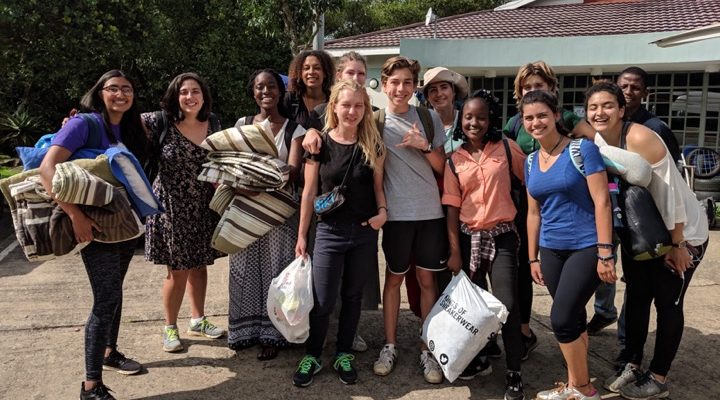
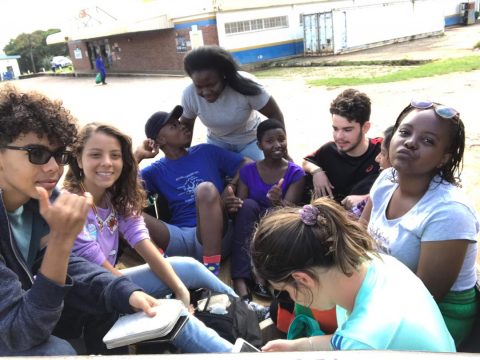 When eight participants and two facilitators gathered on Kathy’s porch on a dark Monday night, one could hear nothing but her voice, the sound of her four dogs, and the crickets. With her characteristic American accent, she introduced herself as the director of the 25-year-old Swazi non-profit Vusumnotfo, which aims to develop skills at family and community levels to help all children develop and learn. Because, as the Swazi saying goes, “Umntfwana ngumliba loya embili” (“the betterment of the future is through the child”). The director explained that sponsors recently challenged her and her NGO to really honor their goal by reaching all children, including those that live with disabilities.
When eight participants and two facilitators gathered on Kathy’s porch on a dark Monday night, one could hear nothing but her voice, the sound of her four dogs, and the crickets. With her characteristic American accent, she introduced herself as the director of the 25-year-old Swazi non-profit Vusumnotfo, which aims to develop skills at family and community levels to help all children develop and learn. Because, as the Swazi saying goes, “Umntfwana ngumliba loya embili” (“the betterment of the future is through the child”). The director explained that sponsors recently challenged her and her NGO to really honor their goal by reaching all children, including those that live with disabilities.
Over the following two days, we accompanied Vusumnotfo workers to four different homesteads in the region, each inhabited by a family featuring one or more children with motor difficulties. Our interventions included building ramps for adults to maneuver wheelchairs more easily, crafting seats using tires and ropes, and planting native trees that will generate shade and refreshment in the future.
The experience was a fantastic opportunity to immerse ourselves in the issues that affect children with disabilities, as well be a part of the long-term solution. We definitely encourage everyone to learn more about Vusumnotfo and what they stand for. After all, as we know, the future is in children.
Mpaka Refugee Camp
By Aparna Paul, Chiedza Sibanda, and Hippolyte Labenne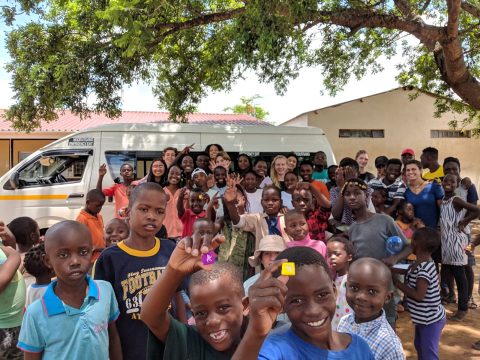 After an hour and a half of watching the lovely eSwatini scenery pass by, our kombi was welcomed at Mpaka by an enthusiastic swarm of happy children. They clung to our hands, elbows and backs, played with our hair, and helped us move our luggage and mattresses to our rooms. We got a tour of the camp and saw the different houses, the library, and the preschool with its adjacent playground. Everywhere we went, people were friendly, greeting us with a smile and “hello!”
After an hour and a half of watching the lovely eSwatini scenery pass by, our kombi was welcomed at Mpaka by an enthusiastic swarm of happy children. They clung to our hands, elbows and backs, played with our hair, and helped us move our luggage and mattresses to our rooms. We got a tour of the camp and saw the different houses, the library, and the preschool with its adjacent playground. Everywhere we went, people were friendly, greeting us with a smile and “hello!”
We had access to an industrial kitchen, and on the first night, we cooked our rice, beans, and vegetables. Some of us chopped veggies, some made rice, and some searched for twelve spoons with which to enjoy our feast. When we realized there were no plates and not enough chairs, we simply put down our huge pot of food on the floor, gathered round, and dug in. The whole two days were a study in on-the-spot problem solving.
We were placed in a house with three bedrooms and a common room. Rather than separating into the bedrooms, the seven girls all put down our mattresses together in the common room, while our one boy was asked by the camp manager to sleep in a separate room.
The rest of the experience consisted of interactions with the camp manager, adults and youth living in the camp. Our group had the opportunity to facilitate a session for the youth group at the camp, and we had a blast playing games, debating pressing issues, and simply learning about each other’s’ ways of life. We got to attend a church service, hosted by and for the refugees, and the passion and gratitude there was nearly overwhelming.
Each interaction opened our eyes on different aspects of being a refugee. There was no one refugee experience. Some come from the DRC, while others come from Burundi and Rwanda. Some have been ousted by war, others by politics. Some were educated professionals in their home countries, others were agriculturalists. But most importantly, these are people who are connected with each other through language, sacrifice, and a shared sense of community. By the end of the community stay, each of us had been inspired by at least one person’s story.
Cabrini Missionaries at St. Phillips
By Rumbidzaishe Marufu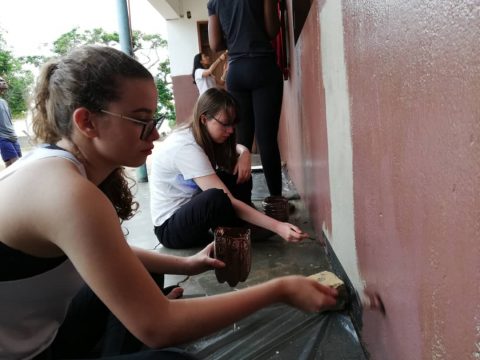 It all started with a long bus ride past Mbabane and Manzini towards one of Swaziland’s most remote and least visited areas. The ride brought us to a collection of houses including a police office, a church and a small clinic including an orphanage led by Cabrini, an NGO working in the area. We were welcomed warmly by the sister in charge and shown to the hostel we would sleep in.
It all started with a long bus ride past Mbabane and Manzini towards one of Swaziland’s most remote and least visited areas. The ride brought us to a collection of houses including a police office, a church and a small clinic including an orphanage led by Cabrini, an NGO working in the area. We were welcomed warmly by the sister in charge and shown to the hostel we would sleep in.
The organization provides community care to the local community—healthcare, support, education—and our assignment was to paint a hostel that will be used for youth who are orphans or who cannot stay with their parents, to stay.
The next morning, a few early birds woke up at dawn to prepare the paint-buckets and paintbrushes. By around 8 o’clock, everybody was fed, changed and ready to go. The task seemed immense and impossible to accomplish in a day and a half, but we switched on the music and began.
After a long and tiring morning we had finished two faces of the house, so we broke for lunch. Storm clouds started gathering in the sky at around 4, but we refused to be swayed. We had finished half of the third face when lightening lit up the sky, so we had to leave it half done and retreat indoors to prepare dinner. Later in the evening, we built a bonfire and prepared s’mores. Packed full of sugar, friendly conversation and laughter flowed, and everyone tried, in vain, to fall asleep.
The next morning, we were awoken up by some eager beavers and headed out to finish what we’d started. We discovered it wasn’t just the walls, but the roof had be painted too. Our determination to leave the orphanage on time sparked fresh energy. The last two walls were finished before lunch and the girls had a chance to talk to one of the women at the NGO while the boys attempted to finish the roof. She was from Australia and informed us that most of the children had been orphaned by the spread of HIV in the area.
After packing, washing our dishes and cleaning the space we had used, we hit the road with images of the orphans who had cried on our departure and contemplations of how privileged we each were. Humbled by the experience and grateful for the memories made, we made it back to campus safe and sound.
Mahamba Gorge
By Alberto Abdal and Francisco Nsabimana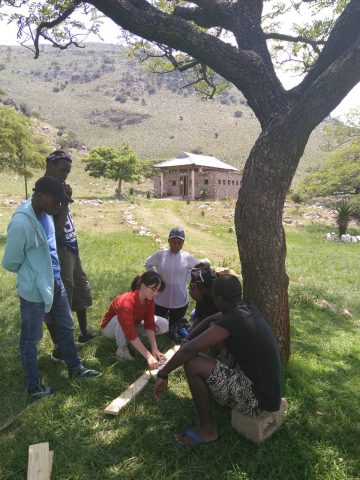 The group to Mahamba Gorge had the furthest to travel, so was the first to leave. We arrived at Mahamba Gorge and discovered it is community tourism project, shared between nine local stakeholders including the church and local villages. We were offered a warm welcome by Babe Kunene, and were shown to our respective rooms. A few hours later we were all gathered in the living room, laughing and joking as some of the non-Swazis tried to pronounce difficult siSwati words.
The group to Mahamba Gorge had the furthest to travel, so was the first to leave. We arrived at Mahamba Gorge and discovered it is community tourism project, shared between nine local stakeholders including the church and local villages. We were offered a warm welcome by Babe Kunene, and were shown to our respective rooms. A few hours later we were all gathered in the living room, laughing and joking as some of the non-Swazis tried to pronounce difficult siSwati words.
At 7 am the next morning, we were awoken by singing birds along the Mkhondo river which flowed just a few meters away from the houses. Everybody was ready to challenge the terrific mountain by hiking. We didn’t reach the top because we had to return for breakfast, but we made a valiant attempt! Returning to Mahamba Gorge, we performed a clean-up of the area while cracking jokes and chuckling. We also painted some signs to signpost the hiking trails.
Later, Mr. Dlamini Lungelo an executive officer of Mahamba Gorge met us and told us about his own experiences in the gorge. He told us a local myth about a seven-headed snakes that lives in the pond under a nearby waterfall. So of course, we were all paranoid about snakes for the rest of the trip! Only Joy, one of our facilitators, was brave enough to swim in the pond.
Later that day we walked to visit the oldest church in eSwatini. The church is 107 years old and is located about 5 km away from the Gorge. It was set in an amazing location, flanked by the last hill in eSwatini, just before the border with South Africa. The amazing ancient scenes left our mouths open in awe.
Over dinner, we enjoyed singing and dancing by some of the Swazis in our group, and had deep conversations about love and witchcraft. The next morning, we woke up at 7 am and took-off on another hike. On coming back, we began packing, and posted some of the boards we had painted the previous day.
Guba Organic Farm
By Miyanda Mahlangu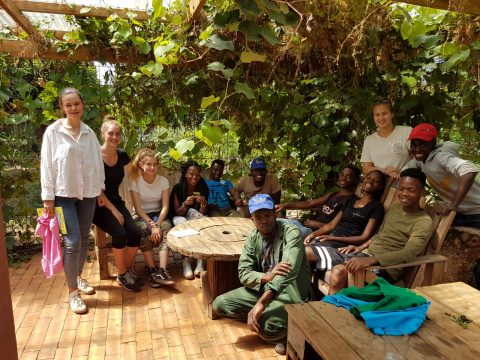 The group going to Guba left a day later than everyone else, so we spent our first evening cooking and hanging out in one of the facilitator houses. They next morning we left for Guba, which is situated in Malkerns in the Hhohho region of eSwatini. Guba is a permaculture non-profit organization which focuses on sustainable agriculture. Guba is built around core principles of minimizing waste, sustainability, and the interrelatedness of systems.
The group going to Guba left a day later than everyone else, so we spent our first evening cooking and hanging out in one of the facilitator houses. They next morning we left for Guba, which is situated in Malkerns in the Hhohho region of eSwatini. Guba is a permaculture non-profit organization which focuses on sustainable agriculture. Guba is built around core principles of minimizing waste, sustainability, and the interrelatedness of systems.
On our arrival, we were given a tour around Guba by two staff, one of whom is a UWC-USA grad. The first stop on our tour was the toilet. Yes, the toilet. Unlike other toilets, the toilets at Guba are compost toilets. Instead of water, one uses saw dust to cover their human waste. The waste turns into compost and is used to fertilize different plants around Guba. The next was the showers, which use paraffin to warm the water. Guba also has a worm farm, which uses discarded old bath tubs to cultivate worms which are fed recycled food waste. The worms digest the waste and then produce their own waste which is turned into manure to be used on the plants. One of the principles of Guba is to use as few harmful chemicals as possible, so even the fertilizers are natural.
On Wednesday morning, we woke up to have breakfast and headed to the garden to create compost. We started by removing weeds, and from there, went on to collect topsoil, manure, dried grass and waste products. We made compost in layers, using the materials we had collected. After a short tea break, we had another tour around Guba, this time of the nursery, kindergarten, playground, garden and the herbal garden.
It was finally time to travel back to campus, but not without learning a lot about permaculture and sustainable agricultural systems.